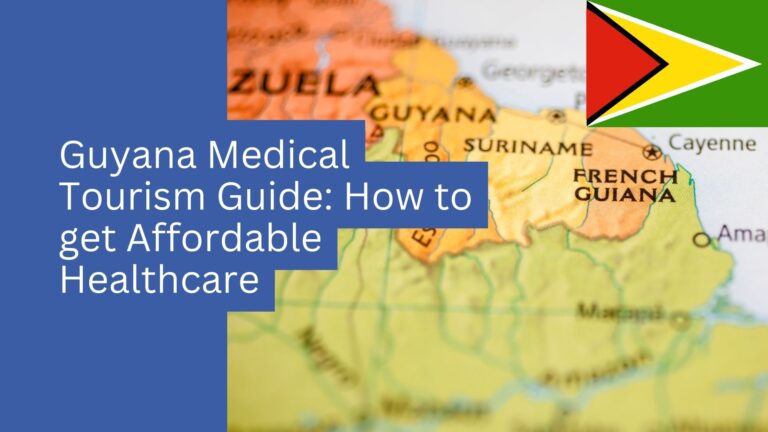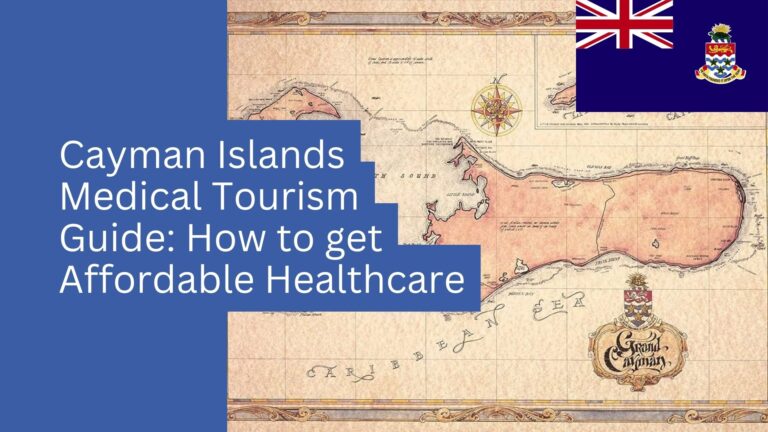Book Appointment Now
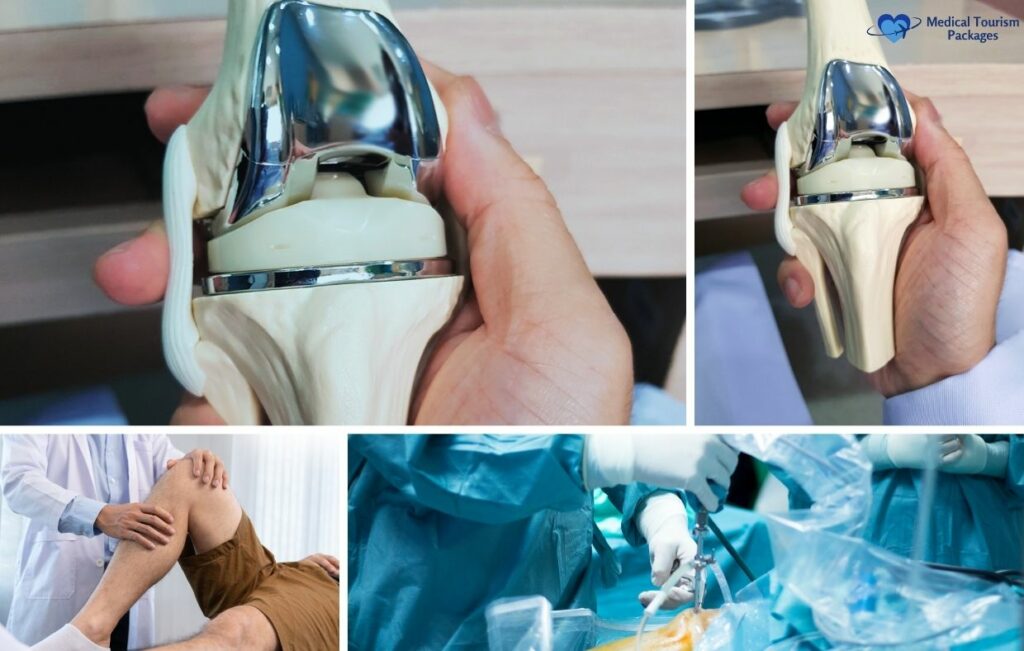
Knee Replacement in Colombia: Patient Guide to Surgery and Medical Tourism
Knee replacement surgery in Colombia costs $7,000-$12,500, which is 70-80% less than US prices of $35,000-$50,000 at JCI-accredited hospitals.
JCI-accredited hospitals in Bogotá, Medellín, Cali, and Bucaramanga use Mako and ROSA robotic systems for precise joint replacement. Board-certified orthopedic surgeons like Dr. Carlos Hernández and Dr. Luis Alberto Salazar perform 97% successful knee replacements with FDA-approved implants.
This guide covers hospital selection, surgeon credentials, surgical techniques, and recovery planning. You will learn how to navigate costs, travel logistics, and aftercare for successful knee replacement in Colombia.
What Is Knee Replacement Surgery?
Knee replacement surgery, also called knee arthroplasty, removes damaged bone and cartilage from your knee joint. Surgeons replace worn surfaces with an artificial joint made of metal and medical-grade plastic. This procedure helps people with severe arthritis or knee injuries when medications and physical therapy no longer work.
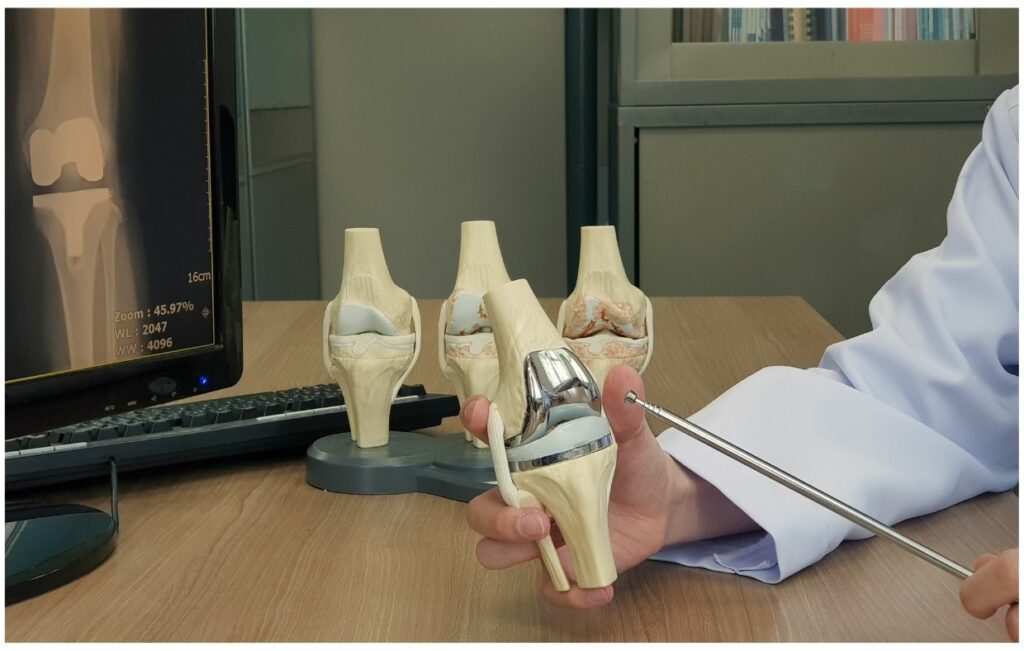
Knee replacement helps you return to daily activities with less pain and better mobility. Around 90% of patients report significant pain relief and improved function. This procedure has high success rates and improves quality of life.
How Much Does Knee Replacement Cost in Colombia?
Knee replacement in Colombia costs $7,000-$12,500. This is 70-80% less than US prices of $35,000-$50,000. The price includes surgery, hospital stay, implant, and initial physical therapy. Quality remains high because Colombian surgeons use FDA-approved implants from Stryker, Zimmer Biomet, and DePuy.
| Expense Category | Colombia (USD) | United States (USD) | Europe (USD) |
| Total Procedure Cost | 7,000 – 12,500 | 35,000 – 50,000 | 10,000 – 25,000 |
| Hospital Stay (3-5 days) | 1,000 – 2,000 | 5,000 – 10,000 | 3,000 – 7,000 |
| Implant Device Cost | 2,500 – 4,500 | 6,000 – 12,000 | Variable |
| Physical Therapy (per session) | 20 – 50 | 75 – 200 | 50 – 100 |
| MRI / CT Scans | 200 – 400 | 1,000 – 3,000 | 500 – 1,500 |
Colombian hospitals include longer hospital stays in their packages. Patients stay 3-5 days with monitored recovery. US hospitals often discharge patients within 24-48 hours. This extended care reduces complications and improves outcomes.
What Costs Are Included in Surgery Packages?
Costs included in surgery packages cover bundled pricing from Colombian hospitals. This transparency helps you plan your budget without surprises.
Standard package components ($7,000-$12,500):
- Surgical Fees: Main surgeon, assistant, anesthesiologist, and operating room use.
- Prosthesis: FDA-approved implant from Stryker, Zimmer Biomet, or DePuy.
- Hospitalization: 2-4 nights in a private room with nursing care and meals.
- Pre-operative Tests: Blood work, EKG, and chest X-ray performed 1-2 days before surgery.
- Post-operative Care: In-hospital physical therapy and medication.
- Logistics: Airport transfers and transport to medical appointments.
What Additional Costs Should You Budget For?
You should budget for additional costs not included in standard packages:
- Robotic Surgery Surcharge ($1,000-$2,500): Mako or ROSA robotic systems cost extra due to CT planning and disposable components.
- Extended Rehabilitation ($20-$50 per session): Outpatient physical therapy after hospital discharge.
- Recovery Accommodation ($500-$1,000 per week): Medical recovery houses with 24/7 nursing near the hospital.
- Complications Insurance ($300-$600): Coverage for medical evacuation or revision surgery if needed.
- Specialized Implants: Oxinium implants for metal allergies may cost extra.
Why Choose Colombia for Knee Replacement Surgery?
You should choose Colombia because it offers advanced technology, experienced surgeons, and significant cost savings. The country has transitioned from “low cost” to “high value” orthopedic care. JCI-accredited hospitals in Bogotá, Medellín, Cali, and Bucaramanga use the same robotic systems as top US medical centers.
Colombian surgeons complete fellowships in the US and Europe. Many hold memberships in the American Academy of Orthopaedic Surgeons. They use FDA-approved implants from global manufacturers. Success rates at JCI hospitals reach 97%, matching top US institutions.
Which JCI-Accredited Hospitals Perform Knee Replacement?
The best hospitals for knee replacement in Colombia have JCI accreditation. This certification means they meet the same safety standards as top US hospitals:
- Fundación Santa Fe de Bogotá: The first Colombian hospital with JCI certification for its Joint Replacement Program. Handles complex revisions and high-risk patients. Affiliated with Universidad de los Andes.
- Clínica Imbanaco (Cali): Part of Spain’s Quirónsalud hospital group. Uses Mako robotic surgery system. Direct flights from Miami make it accessible for Florida patients.
- Hospital Internacional de Colombia (Bucaramanga): Built specifically for medical tourism with an on-site hotel. Pioneer in robotic joint replacement with over 100 Mako procedures completed.
- Clínica Reina Sofía (Bogotá): Part of the Keralty network. Strong international patient program with accommodation assistance in Bogotá’s northern district.
Which Surgeons Specialize in Knee Replacement?
The best Colombian orthopedic surgeons have international training and extensive experience:
- Dr. Carlos Hernández (Fundación Santa Fe, Bogotá): 25+ years experience in hip and knee arthroplasty. Known for minimally invasive techniques and precision in complex primary replacements.
- Dr. Luis Alberto Salazar Gamboa (HIC, Bucaramanga): Director of the Hip/Knee Center. Fellowship in Reconstructive Surgery. Pioneer in Mako robotic surgery in the Santander region.
- Dr. Paul Stangl Correa (Clínica Imbanaco, Cali): Leader of the Joint Replacement Center. Epidemiologist background ensures data-driven approach to outcomes and infection control.
- Dr. Alfredo Martínez Rondanelli (Fundación Valle del Lili, Cali): Head of Orthopedics. AO Fellow trained at University of Alabama. Renowned researcher on bone healing and complex reconstruction.
- Dr. Andrés Felipe Salazar (Clínica Imbanaco, Cali): 20+ years experience in arthroscopy and sports medicine. Expert in rapid recovery protocols for active patients.
- Dr. Miguel Farfán (Clínica Los Nogales, Bogotá): Trained at UNAM in Mexico. Known for high patient satisfaction and transparent pricing.
What Surgical Techniques Are Used in Colombia?
Surgical techniques used in Colombia match or exceed US standards. Surgeons in Bogotá, Medellín, Cali, and Bucaramanga offer robotic-assisted, computer-guided, and minimally invasive options.
How Does Robotic Knee Replacement Work?
Robotic knee replacement uses computer guidance to improve surgical precision. Colombian hospitals use two main robotic platforms:
- Mako SmartRobotics (Stryker): Used at HIC Bucaramanga and Clínica Imbanaco in Cali. Creates a 3D model from CT scans before surgery. The robotic arm provides haptic feedback to prevent cutting outside planned boundaries. HIC reports 26% shorter hospital stays with Mako surgery.
- ROSA Knee System (Zimmer Biomet): Uses X-rays instead of CT scans for less radiation. Provides real-time data on ligament tension throughout surgery. Ensures a balanced knee that feels natural.
What Other Surgical Options Are Available?
Other surgical options available in Colombia include:
- Minimally Invasive Surgery (MIS): Smaller incisions with less tissue disruption. Reduces pain, shortens hospital stays, and speeds recovery.
- Computer-Assisted Surgery (CAS): Computer technology guides implant placement. Improves precision and may increase implant lifespan.
- Partial Knee Replacement: Replaces only the damaged compartment. Preserves healthy bone and tissue. Faster recovery than total replacement.
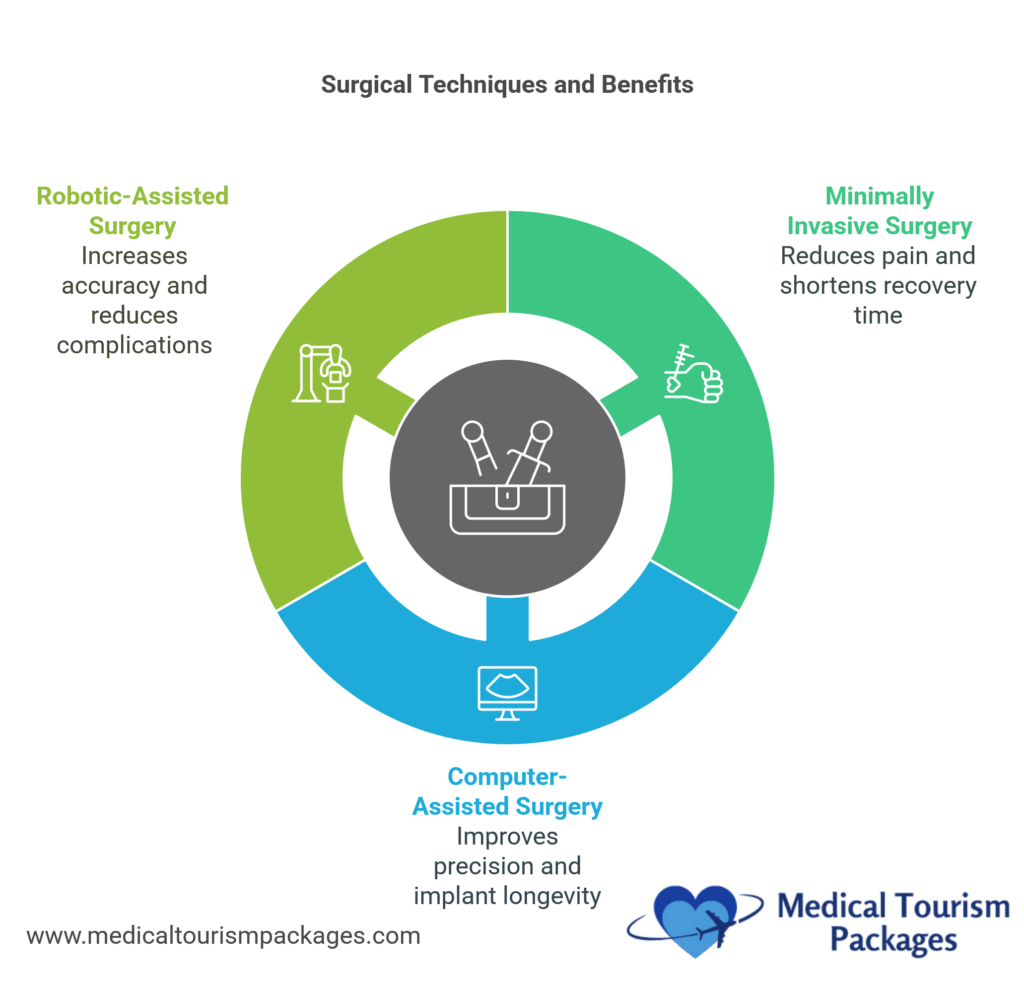
What Implant Brands Are Used?
Implant brands used in Colombia include FDA-approved options from the same global manufacturers as US hospitals:
- Stryker Triathlon: Standard choice for Mako robotic surgeries.
- Zimmer Biomet Persona: Personalized knee system with smart implant option.
- Smith & Nephew Oxinium: Oxidized zirconium for patients with metal allergies.
- DePuy Attune: Widely available across Colombian hospitals.
Some hospitals offer Persona IQ smart implants. These contain sensors that measure step count, stride length, and range of motion. Data transmits to your surgeon after you return home. This allows remote monitoring of your recovery progress.
How Do You Prepare for Knee Replacement in Colombia?
You can prepare for knee replacement in Colombia by following these steps. Careful planning ensures a smooth experience and good recovery.
How Do You Choose an Accredited Hospital?
You can verify hospital accreditation through the Joint Commission International (JCI) Website. JCI accreditation means the hospital meets international safety and quality standards. Look for hospitals with specific orthopedic certifications and dedicated joint replacement programs.
How Do You Select a Qualified Surgeon?
You can evaluate surgeons by checking their credentials and patient outcomes:
- Check online reviews and patient testimonials on Google, medical tourism forums, and hospital websites.
- Ask for success rate data and the number of knee replacements performed annually.
- Verify board certifications and fellowship training locations.
- Schedule telemedicine consultations to discuss your case before traveling.
What Pre-Surgery Tests Are Required?
The following pre-surgery tests are required before your knee replacement:
- Blood Tests: Check for anemia, infection, and clotting function.
- Urinalysis: Detects kidney dysfunction or urinary infections.
- Cardiac Evaluation: EKG and stress test based on your health history.
- Chest X-Ray: Evaluates lung health for anesthesia safety.
- Joint Evaluation: Examines knee range of motion and strength.
- CT Scan: Required for Mako robotic surgery planning.
What Happens During Post-Surgery Recovery?
During post-surgery recovery, you stay in the hospital for monitoring and begin physical therapy. The stay length depends on your progress. Colombian hospitals typically keep patients 3-5 days, longer than US hospitals. This extended care improves outcomes.
Recovery happens in three phases:
- Immediate Post-Op (24-48 hours): Monitoring in the recovery room. Pain management and early mobility exercises begin.
- Hospital Stay (3-5 days): Continued pain management and wound care. Supervised physical therapy sessions.
- Early Rehabilitation (weeks to months): Outpatient physical therapy to improve range of motion and strength.
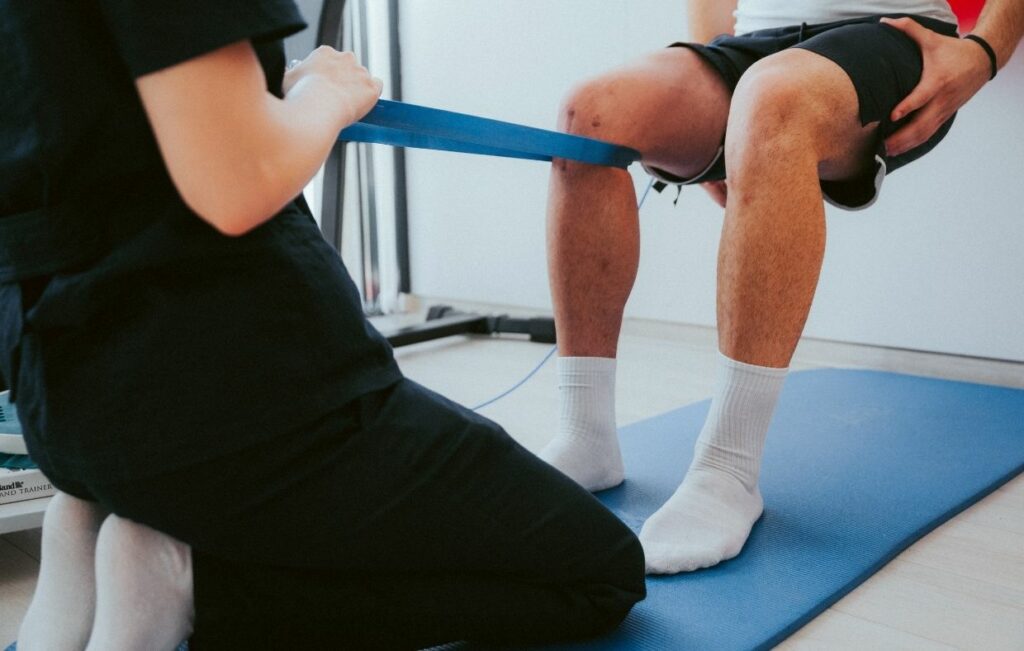
HIC in Bucaramanga operates as a certified “Pain-Free Hospital.” They use multimodal analgesia including nerve blocks and specialized pumps. This addresses patient fears about post-surgical pain.
How Do You Navigate Medical Tourism in Colombia?
You can navigate medical tourism in Colombia by planning for visas, travel, and accommodation. Understanding these logistics ensures a stress-free experience.
What Are the Visa Requirements?
Visa requirements depend on your citizenship and stay duration. US, Canadian, and EU citizens receive a 90-day entry permit without a visa. This covers most medical trips. If complications require a longer stay, hospitals help process a Type V Medical Treatment Visa.
How Do You Get to Colombian Hospitals?
You can get to Colombian hospitals by flying into these airports:
- Bogotá (El Dorado Airport): Most direct flights from US cities. Serves Fundación Santa Fe and Clínica Reina Sofía. Carriers: Avianca, American, Delta, LATAM.
- Cali (Alfonso Bonilla Aragón Airport): Direct flights from Miami and Fort Lauderdale. Serves Clínica Imbanaco and Fundación Valle del Lili.
- Bucaramanga (Palonegro Airport): Spirit Airlines flies from Fort Lauderdale. Most patients connect through Bogotá or Panama City to reach HIC.
Note: Bogotá sits at 2,640 meters elevation. Patients with COPD or heart conditions may prefer Cali or Bucaramanga at lower altitudes.
Where Should You Stay During Recovery?
You should stay at one of these recovery accommodation options:
- Medical Hotels ($80-$150/night): Hotels like Hyatt Place near Fundación Santa Fe offer medical rates.
- Recovery Houses ($500-$1,000/week): Specialized facilities with 24/7 nursing, meals, and transport.
- On-Site Hotel (HIC Bucaramanga): Hospital complex includes integrated hotel accommodation.
How Do You Find English-Speaking Staff?
You can find English-speaking staff at hospitals with international patient departments. JCI-accredited hospitals offer translation services. Our guide to medical tourism in Colombia explains how to find bilingual support throughout your journey.
What Aftercare Is Available in Colombia?
Aftercare in Colombia includes physical therapy, follow-up appointments, and rehabilitation services. Comprehensive aftercare leads to high patient satisfaction and successful recovery.
What Physical Therapy Options Are Available?
Physical therapy options in Colombia include:
- In-Hospital Physical Therapy: Acute care therapy starts immediately after surgery. Focuses on early mobilization, pain management, and basic movement.
- Outpatient Clinics: Advanced therapy for long-term recovery. Services include hydrotherapy, electrostimulation, and custom exercise programs. Cost: $20-$50 per session.
What Follow-Up Care Will You Receive?
You will receive follow-up care according to this schedule:
- 1-2 Weeks Post-Op: Wound inspection and stitch removal. Assessment of healing and pain levels.
- 6 Weeks Post-Op: X-rays to check implant positioning. Rehabilitation plan adjustments based on progress.
- 3, 6, and 12 Months Post-Op: Long-term monitoring of joint function and implant integrity. Can be done locally or via telemedicine with your Colombian surgeon.
Patients with Persona IQ smart implants can share recovery data remotely with their surgeon. The implant sensors track your activity and range of motion automatically.
What Are the Risks of Knee Replacement Surgery?
The risks of knee replacement surgery include infection, blood clots, and implant issues. These complications are rare at JCI-accredited hospitals. Advanced techniques and thorough post-operative care minimize risks. Colombian hospitals report 97% success rates.
How Are Surgical Risks Managed?
Surgical risks are managed through prevention and monitoring:
- Infection: Prevented with strict sterilization, antibiotics, and careful wound monitoring.
- Blood Clots: Prevented with early movement, blood thinners, and compression stockings.
- Implant Issues: Minimized with robotic precision, high-quality materials, and proper sizing.
What Are Realistic Recovery Expectations?
Realistic recovery expectations include gradual improvement over several months:
- 3-6 Weeks: Most patients return to light daily activities.
- 6-12 Months: Full recovery with maximum mobility achieved.
- Long-Term: Around 90% of patients report significant pain relief. Most return to daily activities and low-impact sports.
Recovery requires commitment to physical therapy and patience. Your Colombian surgeon will set specific goals based on your condition.
How Do You Return Home After Surgery?
You can return home after surgery by coordinating with your medical team and planning for continued care. Most patients fly home 1-2 weeks after surgery.
When Should You Plan Your Return Travel?
You should plan your return travel based on your surgeon’s assessment:
- Timing: Most patients can fly within 1-2 weeks after surgery. Your surgeon confirms when flying is safe.
- Flight Arrangements: Request wheelchair assistance at airports. Book aisle seats for easier movement. Wear compression stockings to prevent blood clots.
- Travel Companion: Bring someone to help with luggage and provide support during travel.
How Do You Coordinate Follow-Up Care at Home?
You can coordinate follow-up care at home by sharing your records with local providers:
- Schedule Follow-Ups: Arrange appointments with a local orthopedist before you leave Colombia.
- Share Medical Records: Your Colombian hospital provides surgical notes, X-rays, and rehabilitation protocols.
- Continue Physical Therapy: Find a local therapist and share your Colombian rehabilitation plan.
- Telemedicine Options: Many Colombian surgeons offer video consultations for remote follow-up.
Ready to Start Your Knee Replacement Journey in Colombia?
Medical Tourism Packages connects you with board-certified orthopedic surgeons at JCI-accredited hospitals in Bogotá, Medellín, Cali, and Bucaramanga. We coordinate your entire journey including hospital selection, travel arrangements, accommodations, and bilingual support. Get a free consultation to discuss your needs and receive a personalized quote.
Contact us today to start planning your knee replacement in Colombia.
Frequently Asked Questions
What is knee replacement surgery?
Knee replacement surgery removes damaged bone and cartilage from your knee joint. Surgeons replace worn surfaces with an artificial joint made of metal and medical-grade plastic. This procedure helps people with severe arthritis or knee injuries return to daily activities with less pain.
Why should I consider Colombia for knee replacement surgery?
You should consider Colombia because it offers 70-80% cost savings with the same quality as US hospitals. JCI-accredited facilities in Bogotá, Medellín, Cali, and Bucaramanga use Mako and ROSA robotic systems. Board-certified surgeons with US and European training perform 97% successful procedures.
How much does knee replacement surgery cost in Colombia?
Knee replacement surgery in Colombia costs $7,000-$12,500. This includes surgery, hospital stay, implant, and initial physical therapy. The US costs $35,000-$50,000 for the same procedure. Robotic surgery adds $1,000-$2,500 to the base price.
What are the risks of knee replacement surgery?
The risks of knee replacement surgery include infection, blood clots, and implant problems. These complications are rare at JCI-accredited hospitals. Colombian hospitals report 97% success rates. Proper surgical techniques and post-operative care minimize these risks.
How long does recovery take after knee replacement surgery?
Recovery takes 3-6 weeks to return to light activities. Full recovery requires 6-12 months. Physical therapy is essential for regaining strength and mobility. Around 90% of patients report significant pain relief and return to daily activities.
Do Colombian hospitals use robotic surgery for knee replacement?
Yes, Colombian hospitals use robotic surgery systems. HIC in Bucaramanga and Clínica Imbanaco in Cali use Mako SmartRobotics. Other hospitals use the ROSA Knee System. Robotic surgery improves precision and may reduce hospital stays by 26%.
When can I fly home after knee replacement in Colombia?
You can fly home 1-2 weeks after knee replacement surgery. Your surgeon confirms when flying is safe based on your recovery progress. Wear compression stockings and request wheelchair assistance at airports. Bring a travel companion for support.


